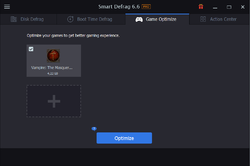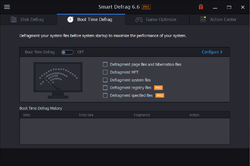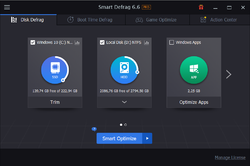Cada día ofrecemos un programa licenciado GRATIS que de otra manera tendrías que comprar!

Giveaway of the day — Smart Defrag Pro 6.6
Smart Defrag Pro 6.6 estaba como Giveaway el día n 1 de octubre de 2020
Smart Defrag 6 is a reliable, stable, yet easy-to-use disk optimizer designed for peak hard drive performance. Unlike other traditional disk defragmenters which only provide defragmentation, Smart Defrag 6 also intelligently streamlines your files based on using frequency to accelerate disk data access.
With the improved IObit disk defrag engine, Smart Defrag 6 not only defrags your HDD but also trims your SSD to accelerate disk access speed and enhance disk durability. Smart Defrag 6 specially optimized the file organization algorithm on Windows 10. To make it more powerful, Smart Defrag 6 also delivers several other useful features. Boot Time Defrag can defrag Windows registry to release more occupied RAM and ensure the system stability while you can customize Boot Time Defrag as per your needs. Meanwhile, Auto Defrag and Scheduled Defrag ensure your disks are always optimized to their top performance. Furthermore, Game Optimize is designed to offer gamers ultra-smooth gaming experience. The last but not the least, Disk Health can help you monitor your disk status in real-time.
Please note that the current license is provided for 6 months, and the Pro version is activated upon license registration.
The current text is the result of machine translation. You can help us improve it.
Requerimientos del Sistema:
Windows XP/ Vista/ 7/ 8/ 8.1/ 10
Publicado por:
iObitPágina Oficial:
http://www.iobit.com/iobitsmartdefrag.phpTamaño del Archivo:
14.9 MB
Licence details:
6 months with full support
Precio:
$19.99




Comentarios en Smart Defrag Pro 6.6
Please add a comment explaining the reason behind your vote.
Aah, defrag software. Once an essential part of any computer maintenance. It could help speed up opening programs from thirty seconds to fifteen - an increase of 50%, simply by making sure all the 'chunks' of the file were together. Back in ye olde days, hard drives spun a lot slower than they do now and access times were a lot slower, so if a hard drive had to read ten chunks of a file, it would take ten disc rotations at least.
Nowadays, drives are a lot quicker, with 7200 RPM drives the norm (assuming non SSD drives) with most having cache memory included, plus speedier access times. If you've an SSD, then you've even quicker (if not instantaneous) access times.
This all means that defrag software is all but unnecessary. There would be negligable benefits obtained from running the software.
Aah, forgot to mention that drive sizes have also increased and NTFS is the norm in file systems. This also reduces defragmentation. Years ago, a drive would have to write a file, and it would start saving it at the beginning of the drive, utilising any free space it found. This caused defragmentation, as nine times out of ten, the size of the file would be larger than the free space block found. The drive would have to find the next free block, and so on. Fragmentation. NTFS improved this as it knew the size of the file to save, it would find (if possible ) a free block the required size. Most users these days have GB's of free space, so finding a free block is nearly guaranteed.
Save your time, save your disk space and don't bother installing this - it really isn't necessary ... especially if you have an SSD. If you don't have an SSD, then look at getting one - they're dirt cheap these days and can dramatically speed up your computer*.
* Capacity compared to normal drives can be reduced though, but for most users, 120 GB or 240 GB is plenty...
Save | Cancel
Redphantom, there would be no reason to get a blue screen of death from a fragmented drive - thats not how it works. What has probably happened though, is that you mention your drive is making unusual sounds. A portion of your drive is physically damaged. By defragmenting, you've moved data from the damaged area to a non-damaged area.
I would recommend using Macrium Reflect to create a drive image - your drive is on the way out and could fail at any point. Don't leave this - the longer you leave it, the more chance you have of your drive failing - if Windows stores a vital file in the damaged area (which is now available) and cannot access it later, this is where your system becomes unusable.
Buy a new drive ASAP.
Save | Cancel
Chris, while I agree about the SSD, if you still have an HHD, you still need to defrag it. I thought my windows defrag was taking care of it automatically. I was wrong. My drive fragmentation was over 80% when I realized it and not only was the computer running slowly, the sound wouldn't as it should, I was getting BSOD, and it oftentimes wouldn't boot. Somehow, I realized it needed a defragmentation, which took over a week. Now the computer runs much better.
Save | Cancel
Windows 10 has a built in tools to defrag HDD disks and optimize SSD disks. They are mostly automated. The game defragment affects only loading times if game is installed on HDD. SSD is so fast there is no need to optimize neither a game nor disk very often.
Save | Cancel
Absolutely correct on all points. :)
"However, Windows 10 automatically defragments the hard disk every week. And the good thing is that it’s turned on by default. Whenever Windows finds your PC is sitting idle, it runs a scheduled task in the background which defragments Windows 10."
Save | Cancel